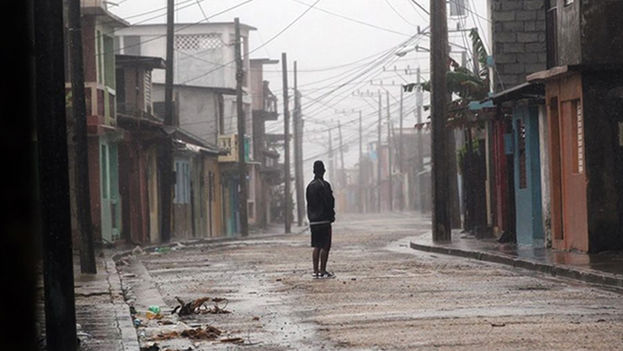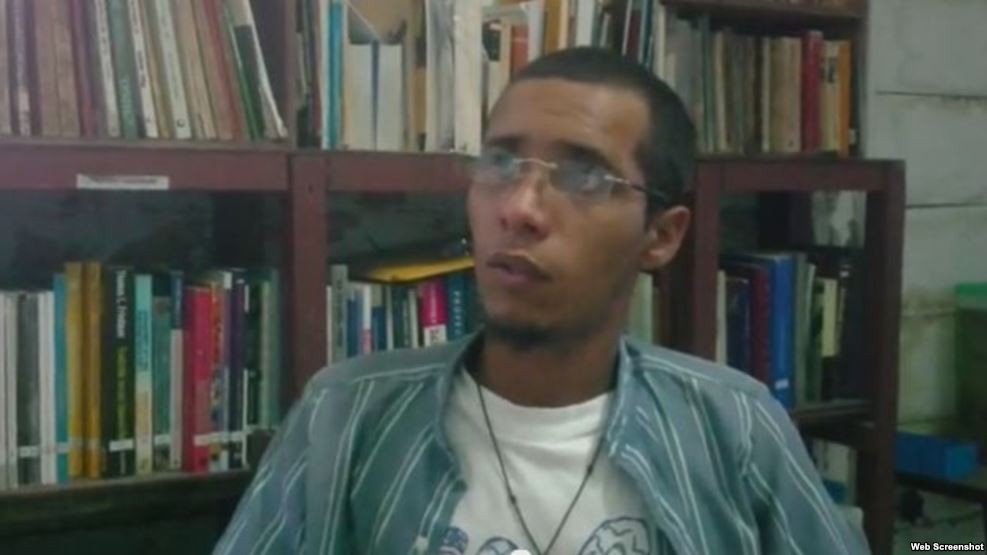
![]() 14ymedio, Juannier Rodriguez Matos, Baracoa, 30 October 2016 — On Wednesday, October 12 at 5:40 pm, when I was on my way to the phone company in downtown Baracoa, the voice of Capitan Alfredo Oliveros ruined my afternoon, “Juannier, let’s go to your house for a moment, we want to talk with you […], we’re going to do a search,” he told me in an arrogant tone of voice.
14ymedio, Juannier Rodriguez Matos, Baracoa, 30 October 2016 — On Wednesday, October 12 at 5:40 pm, when I was on my way to the phone company in downtown Baracoa, the voice of Capitan Alfredo Oliveros ruined my afternoon, “Juannier, let’s go to your house for a moment, we want to talk with you […], we’re going to do a search,” he told me in an arrogant tone of voice.
A patrol car came up the road and the driver and a soldier from the Special Troops got out, handcuffed my hands behind me, and made me get in the back of the car. He got in with me and looked at me so long and fixedly I had to say to him, “Compadre, don’t look at me any more.” He responded, “You wouldn’t want me to pick you up and beat you.”
They took me back to my house and waiting there was Dieser Castro Pelegin (formerly a deputy of the Ministry of the Interior, MINIT, in Baracoa, now I don’t know what he does), the State Security agent Eliner Leyva, an official from the Cuban Revolutionary Police with the ID number 25513, the investigator Diorvys Odelin Lamoth, a van with some six or eight soldiers from the Special Troops, the informers from the Vigilance Committee, Diosmarys Infante Palmero (president of the Federation of Cuban Women) and Meydi Duran Navarro (agent from MINIT’s Special Protective Services Company), along with Alfredo Oliveros.
They showed me a search warrant signed by Elier Lopez Carcases, currently a MINIT deputy in Baracoa. They did not tell me the reason for the search.
They took my computer, a phone, a hard drive, two USB memories, several books and magazines, among other things.
Those hands took my books and threw them in a dirty sack, and with some copies they mockingly said: “This is burning my hands.” They took books that did not even mention Cuba, it was enough that the title would include the words freedom, rights, ethics, civic, transition, journalism and democracy, any of those words that are always repeated in international settings by the experiment called Revolution that is Cuba.
The officers claimed they were subversive books, but they were mine and they had no right to steal them from me. I don’t go to some communist’s house and say, “Hey, that book 100 Hours with Fidel is useless. Give it to me, I’m going to toss it out, it’s 100 hours of lies.”
What hurt me most was that the flash drives and the computer had years of research for my degree in Biology, my diploma work, a recent several months long research project collecting information on a population of polymita brocheri (land snails) in Punta Maisi on which I will publish new results, hours of work in the hot sun in Maisí, dozens of gigabytes of literature on the subject and specialty, as well as personal information.
I begged them to let me keep the items about biology, which is professional work, about those beautiful snails that are a threatened species, that was done for Cuba, I didn’t even know what to say, but as if it was nothing, they didn’t understand they were taking a part of my life.
They took two Cuban flags, one of which I flew from my roof as a gesture of solidarity with the neighbors who lost everything and in appreciation for my brothers all over the island who prayed for us during Hurricane Matthew, which I’m convinced made God protect every human life; and one of which was on the wall at the head of my bed, which made me dream every night about a more just and fraternal country with room for everyone.
Then I was again handcuffed with my hands behind my back and without saying anything they took me to a cell in the Baracoa police station. There I refused to eat and continued to do so the next day, when they took me out again, handcuffed, to a jail in La Maya, in Santiago de Cuba, passing through Imías, San Antonio del Sur and Guantanamo.
The next day in the morning, a MINIT major went to the jail, apparently the second in command in the La Maya unit, and I told him, “Officer, you are violating my right to a phone call.” He responded, “Yes, and we will continue to violate it.”
I told the officer who was guarding the cells I was feeling sick and would he please take me to a doctor. I heard a senior officer reply: “The one from Baracoa, he’s a disgrace, he’s a counterrevolutionary, let him die, it’s not your problem, it’s CI’s (Counterintelligence) problem.” I was in that filthy cell without eating until Saturday morning, when a police official came and put me out on the street.
I arrived in Baracoa the next morning. I went to the MINIT delegation and they told me they weren’t going to return anything, that everything had to be reviewed in Guantanamo and then they would give me an answer.

